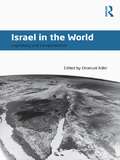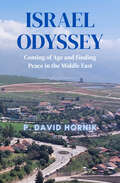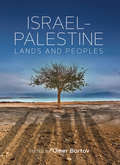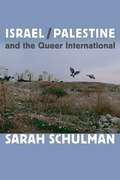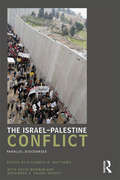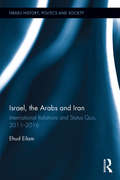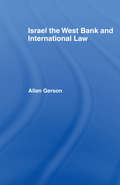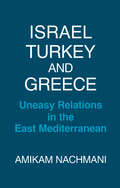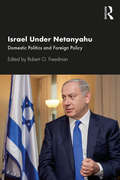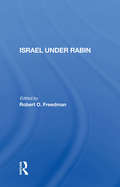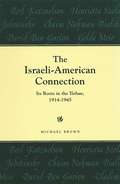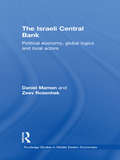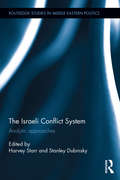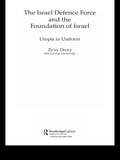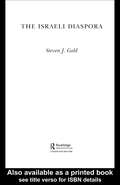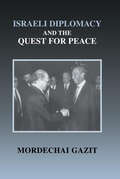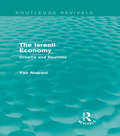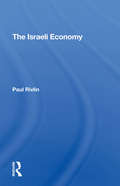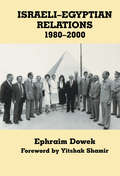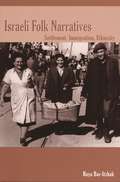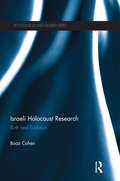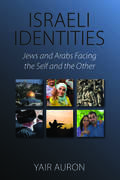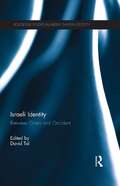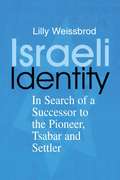- Table View
- List View
Israel in the World: Legitimacy and Exceptionalism
by Emanuel AdlerSince independence, Israel has lived with a paradox, needing and seeking legitimacy, understanding, and empathy from the world community while simultaneously also discounting the world. This volume reflects upon Israel’s troubled attempts to balance its desire to be different from a world that it simultaneously genuinely needs and that it also wants to be a legitimate member of. Gathering distinguished scholars and public figures, this timely book discusses the causes and consequences of Israel’s unsettled relations with the world. With essays ranging from an account of Israel’s exile mentality and the cosmopolitanism of suffering to a fragmenting international legal order and whether an authentic religious process can transform religion into a powerful lever for peace, the book’s innovative analysis will spark both academic and public debate. Israel in the World: Legitimacy and Exceptionalism will appeal to scholars and students with broad ranging research interests including Middle East Studies, Israeli Studies and international relations more generally.
Israel Odyssey: Coming of Age and Finding Peace in the Middle East
by P. David HornikA deeply personal account of an American Jew&’s relocation to the Holy Land from &“one of Israel&’s best-informed and most astute journalists&” (Chicago Jewish Star). What makes a young American Jew who was never encouraged to move to Israel—whether by individuals or in an organizational framework—suddenly decide to do so at age twenty-eight? How does a young American Jewish family, with little background in Hebrew, make its way in a new, highly distinct culture with no more than a shallow resemblance to America&’s? This memoir traces the unlikely emergence in its author of a fascination, a passionate concern, and an identification with Israel that left him no choice but to relocate there. On the one hand, his parents were Austrian Jewish refugees from Nazism; on the other, the family moved to what was then a rural area of New York State where almost no other Jews lived—resulting in a richly complex, albeit confusing and difficult, identity to navigate. Israel Odyssey opens a window on modern Israel as seen by an immigrant both deeply patriotic but, at the same time, carrying cultural baggage from across the ocean. P. David Hornik&’s highly personal story is his quest for inner peace and fulfillment amid the pressures, strife, and special vitality of the old-new Land.
Israel-Palestine: Lands and Peoples
by Omer BartovThe conflict between Israel and Palestine has raised a plethora of unanswered questions, generated seemingly irreconcilable narratives, and profoundly transformed the land’s physical and political geography. This volume seeks to provide a deeper understanding of the links between the region that is now known as Israel and Palestine and its peoples—both those that live there as well as those who relate to it as a mental, mythical, or religious landscape. Engaging the perspectives of a multidisciplinary, international group of scholars, it is an urgent collective reflection on the bonds between people and a place, whether real or imagined, tangible as its stones or ephemeral as the hopes and longings it evokes.
Israel-Palestine: Lands and Peoples
by Omer BartovThe conflict between Israel and Palestine has raised a plethora of unanswered questions, generated seemingly irreconcilable narratives, and profoundly transformed the land’s physical and political geography. This volume seeks to provide a deeper understanding of the links between the region that is now known as Israel and Palestine and its peoples—both those that live there as well as those who relate to it as a mental, mythical, or religious landscape. Engaging the perspectives of a multidisciplinary, international group of scholars, it is an urgent collective reflection on the bonds between people and a place, whether real or imagined, tangible as its stones or ephemeral as the hopes and longings it evokes.
Israel, Palestine and the Queer International
by Sarah SchulmanIn this chronicle of political awakening and queer solidarity, the activist and novelist Sarah Schulman describes her dawning consciousness of the Palestinian liberation struggle. Invited to Israel to give the keynote address at an LGBT studies conference at Tel Aviv University, Schulman declines, joining other artists and academics honoring the Palestinian call for an academic and cultural boycott of Israel. Anti-occupation activists in the United States, Canada, Israel, and Palestine come together to help organize an alternative solidarity visit for the American activist. Schulman takes us to an anarchist, vegan café in Tel Aviv, where she meets anti-occupation queer Israelis, and through border checkpoints into the West Bank, where queer Palestinian activists welcome her into their spaces for conversations that will change the course of her life. She describes the dusty roads through the West Bank, where Palestinians are cut off from water and subjected to endless restrictions while Israeli settler neighborhoods have full freedoms and resources.
The Israel-Palestine Conflict: Parallel Discourses (UCLA Center for Middle East Development (CMED) series)
by Elizabeth G. MatthewsThe conflict between the Israelis and the Palestinians is considered intractable by many, and is frequently characterised by the violence between the two sides. In attempts at peace, the starting point for negotiations is a cessation of violence; beneath this, however, lies a plethora of other issues to be addressed. This unique text brings together Israeli and Palestinian viewpoints on a number of key issues and topics, making clear the points of agreement as well as the views that divide. The chapters deal first with three issues that require compromise and resolution for a peace treaty to be realized - water, refugees, and borders, territory and settlements – and then with three important concepts that can either impede or promote peace: democracy, human rights, and peace culture and education. Thus, the book provides an invaluable opportunity to understand, at least in part, the divergent and even convergent interests and understandings of Israelis and Palestinians on issues and concepts important to the peace process. As such, it will be a valuable resource for courses on conflict resolution, the Middle East peace process, and political science.
Israel, the Arabs and Iran: International Relations and Status Quo, 2011-2016 (Israeli History, Politics and Society)
by Ehud EilamIsrael borders four states – Syria, Egypt, Jordan and Lebanon, and two entities – the Palestinian authority in the West Bank and Hamas in the Gaza stip. In recent years, despite incidents on the border with Syria and Egypt, the basic strategic status quo with these countries has not changed, and the overall balance of power between Israel and the Arabs has been maintained. Due to its military might, none of Israel's Arab neighbours are able to defeat it. Israel, however, for political, economic and military reasons, avoids enforcing its will and interfering in internal Arab matters and has successfully managed to stay out of the Arab turmoil. Israel, the Arabs and Iran gives a detailed overview of the various national security challenges that Israel has faced since 2011. It explains the key considerations and constraints Israel has had to deal with on several fronts, from its northern border with Lebanon to its southern border with Egypt. The book provides the reader with a deep understanding of why and how Israel has struggled to keep the status quo, whilst a large part of the Middle East remains in turmoil. The book is aimed at anyone studying Israel, its Foreign Policy, Middle Eastern Politics and International Relations. It will also appeal to government officials, military officers and anyone working or interested in national security issues concerning the Middle East and particularly Israel.
Israel, the West Bank and International Law
by Allan GersonSynthesizing primary and technical data, this book focuses on the legal and political aspects of Israeli administration in the West Bank and the international attempt to resolve the dispute over the territories. The author assesses the present situation and provides guidelines for future action.
Israel, Turkey and Greece: Uneasy Relations in the East Mediterranean
by Amikam NachmaniFirst Published in 1987. Routledge is an imprint of Taylor & Francis, an informa company.
Israel Under Netanyahu: Domestic Politics and Foreign Policy
by Robert O. FreedmanExamining Benjamin Netanyahu’s more than a decade-long period as Israel’s Prime Minister, this important book evaluates the domestic politics and foreign policy of Israel from 2009-2019. This comprehensive study assesses Israel’s main political parties, highlights the special position in Israel of Israel’s Arab, Russian and religious communities, appraises Netanyahu’s stewardship of Israel’s economy, and analyzes Israel’s foreign relations. The scholars contributing to the volume are leading experts from both Israel and the United States and represent a broad spectrum of viewpoints on Israeli politics and foreign policy. The case studies cover the Likud party, the non-religious opposition parties such as Labor, Meretz, and Yesh Atid, the Arab parties, the religious parties and the Russian-based Yisrael B’Aliyah party, and present analyses of the ups and downs of Israel’s relations with the United States, the American Jewish Community, Iran, Europe, the Palestinians, the Arab World, Russia, China, India, and Turkey as well as Israel’s challenges in dealing with terrorism. Another highlight of the book is an assessment of Netanyahu’s leadership of the Likud party, which seeks to answer the question as to whether Netanyahu is a pragmatist interested in a peace deal with the Palestinians or an ideologue who wants Israel to hold on to the West Bank as well as all of Jerusalem. This volume will be of interest to readers who wish to understand the dynamics of Israel during Benjamin Netanyahu’s time as Prime Minister and are interested in the history and politics of Israel and the Middle East.
Israel Under Rabin
by Robert O FreedmanThe 1992 elections represented a watershed in Israeli politics. Returning to power for the first time in fifteen years, the Labor government, under Yitzhak Rabin, has implemented significant changes in foreign policy and domestic politics. Perhaps the most important changes were Israel's recognition of the PLO and the signing of the Declaration of
The Israeli-American Connection: Its Roots in the Yishuv, 1914-1945 (American Holy Land Series)
by Michael BrownThe Israeli-American Connection examines the ways in which the American experience influenced some of the major leaders of the yishuv, the Jewish settlement in Palestine, during and between the world wars. In six biographical chapters, Michael Brown studies Vladimir Jabotinsky, Chaim Nahman Bialik, Berl Katznelson, Henrietta Szold, Golda Meir, and David Ben-Gurian, focusing on each leader's involvement with and image of America, as well as the impact of America on their lives and careers.
The Israeli Central Bank: Political Economy, Global Logics and Local Actors (Routledge Studies in Middle Eastern Economies)
by Daniel Maman Zeev RosenhekThis book examines the local and global political and institutional processes that have led to the strengthening of the Israeli central bank within the context of the now predominant neoliberal regime. Using Israel as a case study to identify broader patterns around the world, the authors examine the strengthening of central banks as a key dimension of the institutionalisation of the global regime. Drawing on an in-depth analysis of the political economy of the Israeli central bank since the mid-1980s, the authors show how the Bank of Israel mobilized global logics in order to strengthen its position vis-à-vis competing actors, especially the Ministry of Finance, and to promote the institutionalisation of the neoliberal regime. Employing a conflict-centered theoretical perspective, the authors elucidate the character of this institutional transformation and the mechanisms that were involved. Chapters examine the different phases of the process of central bank strengthening, focusing on the actors involved, the interactions between them, and the political strategies they employed, and analyse the consequences of the process for the shift in macro-economic management and in the mode of state involvement in the economy. Addressing the political and institutional processes that have led to the fundamental transformation of Israeli political economy, this book is a valuable addition to the existing literature on the Israeli banking system, political economy and globalisation.
The Israeli Conflict System: Analytic Approaches (Routledge Studies in Middle Eastern Politics)
by Stanley Dubinsky Harvey StarrThe Middle East conflict system is perhaps the world’s most important and intractable problem area, whose developments carry global consequences. An effective investigation of the context and change in the region calls for a melding of academic approaches, methods and findings with policy oriented needs. The Israeli Conflict System brings together leading conflict scholars primarily from political science, applying a range of advanced, rigorous analytic and data-gathering techniques to address this single empirical domain—the contemporary Israeli Conflict System. Recognising the causal complexity of this conflict system, the volume’s central theme is that the system’s current conditions are best understood in their broader temporal/historic, cultural/linguistic, and spatial/geographic contexts. Through the lens of economic, geographic, historical, linguistic, and political analyses, and the application of data analysis, experiments, simulations, and models of rational choice, this volume shows how diverse disciplinary perspectives and methodologies can complement each other effectively. In this way, its chapters provide a model for the integration of factors and contexts necessary for understanding contemporary world politics, and a sampling of theories, approaches, and methods that are applicable, useful, or valid under different conditions. This book offers a cutting-edge resource for scholars and students of Political Science, International Relations, Conflict Studies and Middle East Studies.
The Israeli Defence Forces and the Foundation of Israel: Utopia in Uniform
by Ze'ev DroryThis book discusses the contribution of the Israel Defence Forces (IDF) to the building of the social and educational foundations of the country, and its role in the area of immigrant absorption and settlement during the first years of the Israeli State. The author examines how under the guidance of David Ben-Gurion Israel was able to utilize the values of military organization to combat severe, economic, and social difficulties, and build a civil society to underpin the new state.
The Israeli Diaspora (Global Diasporas)
by Steven J. GoldIn this fascinating study, based on extensive field work in the major Israeli communities of New York, Los Angeles, London, Paris and Sydney, Steven J. Gold looks at their reasons for leaving - existing links abroad, political and economic dissatisfaction at home and, in the case of the Sephardim or Israelis of non-European origin, often a feeling of being treated as second-class citizens - the tensions, compromises and satisfactions involved in their relations with Israelis who have not left and with the Jewish and non-Jewish communities in the countries in which they settle. In a final chapter, he talks to those who, after years as emigrants, have made the decision to return. The end result is a major contribution to the study not just of the Israeli diaspora but also to our wider understanding of migration and transnational identity.Winner of the 2003 Thomas and Znaniecki Award (American Sociological Association International Migration Section)
Israeli Diplomacy and the Quest for Peace (Israeli History, Politics and Society)
by Mordechai GazitThis account of key issues in Israel's foreign policy offers a new insight into Israeli thinking. It also covers issues where the focus is on American, British, Egyptian and Jordanian diplomacy. The author's research is based on an abundance of documentary evidence, and the analysis benefits from his unique background as a senior diplomat for over 30 years and from his academic experience of over two decades.
The Israeli Economy: Dreams and Realities (Routledge Revivals)
by Yair AharoniFirst published in 1991, during a significant stagnation in the Israeli economy, this title discusses the causes of the economic downturn, and assesses the country’s prospects. Throughout, Aharoni measures the economic problems Israel has endured against the social and economic successes it has been able to achieve. He highlights the incongruities of the aspirations of Israel’s founders and supporters and the reality, as well as the interplay of economic and political forces that have shaped this. With a detailed introduction to the ideology and development of the state of Israel, and a history of the Israeli economy and its institutional structure, this title will be of significant value to any student studying the economic history of Israel and the Middle East.
The Israeli Economy
by Paul RivlinThis comprehensive study examines the sources of growth and stagnation in the Israeli economy, focusing on the development of the industrial and agricultural sectors, changes in the supply of labour, the nature of capital markets and the expansion of the defence budget. The author analyzes policies that have been successful in lowering inflation an
Israeli-Egyptian Relations, 1980-2000 (Israeli History, Politics and Society #Vol. 13)
by Ephraim DowekA memoir by former diplomat Ephraim Dowek which provides a comprehensive study of the relations between Egypt and Israel from peace until the present day. This is an informative account of the author's time in Egypt as a high-level Israeli diplomat (he was eventually appointed Ambassador) and as a senior participant in a vital and important aspect of Arab-Israeli relations in the modern era, providing a personal insight into the period when Egypt and Israel entered into an era of peace.
Israeli Folk Narratives: Settlement, Immigration, Ethnicity
by Haya Bar-ItzhakThe goals and challenges that face the people of Israel are vividly illustrated by the country's many folk stories. Here Haya Bar-Itzhak presents these tales--gathered from the early settlers of the kibbutz, from immigrants who arrived in Israel after independence, and from ethnic groups--to create a panoramic view of a fascinatingly complex society. Creating stories set in the past, even the recent past, is a way for societies to express their problems, adversities, yearnings, and hopes. Bar-Itzhak finds this true among inhabitants of the kibbutz, who find their society at a crossroads as a result of changes in Israeli society at large. She reveals the symbolic dimensions of their stories--some dealing with the death of young soldiers (sacrificed sons) in battle--as pointing to the complexity of a local culture that expresses the ethos of Labor Zionism. In a section dealing with the folklore of immigrants, Bar-Itzhak focuses on the narratives of Yemenite Jews and Polish Jews. Their stories express their traumatic meeting with Israeli society while providing a means for coming to grips with it. The final section, dealing with ethnic folklore of Moroccan Jews, explores the wonder tale through the perspective of disabled and elderly storytellers, who in the language of their community seek to defend their own values and norms, and examines the saints' legends and the body language usually employed in the telling of them. Throughout, the author illuminates the unique challenge of experiencing ethnicity as Jews vis-à-vis other Jews. Israeli Folk Narratives combines new data with insightful analyses. Anyone interested in folk stories and Israeli culture will be enlightened by this sensitive, thought-provoking book.
Israeli Holocaust Research: Birth and Evolution (Routledge Jewish Studies Series)
by Boaz CohenAn exploration of the development of Holocaust research in Israel, this book ranges from the consolidation of Holocaust research as an academic subject in the late 1940s to the establishment of Yad Vashem and beyond. Research on the story of historiography is often a work on books, on the "final products" that fill academic bookshelves yet, in Israeli Holocaust Research, Boaz Cohen illustrates that the evolution of holocaust research in Israel has a more human element to it. Drawing on knowledge gained through seven years of work in ten major archives in Israel, the author reveals a previously unseen picture of the development of Israeli Holocaust research "from below," and of the social and cultural forces influencing its character. In doing so, a new facet to the picture emerges, of the story beyond the archive and the people who see Holocaust research as their mission and responsibility. This book will be a fascinating addition to the study of Holocaust research and will be of particular interest to students of history, historiography and Jewish studies
Israeli Identities: Jews and Arabs Facing the Self and the Other
by Yair AuronThe question of identity is one of present-day Israel's cardinal and most pressing issues. In a comprehensive examination of the identity issue, this study focuses on attitudes toward the Jewish people in Israel and the Diaspora; the Holocaust and its repercussions on identity; attitudes toward the state of Israel and Zionism; and attitudes toward Jewish religion. <p><p> Israeli Arab students (Israeli Palestinians) and Jewish Israeli students were asked corresponding questions regarding their identity. It was found that, rather than lessening its impact over the years, the Holocaust has become a major factor, at times the paramount factor in Jewish identity. Similarly, among Palestinians the Naqba has become a major factor in Palestinian-Israeli identity. <p> However, the overall results show that the identity of a Jewish citizen of Israel is not purely Israeli, nor is it purely Jewish. It is, to varying degrees, a synthesis of Jewish and Israeli components, depending on the particular sub-groups or sub-identities. The same holds for Israeli-Arabs or Israeli-Palestinians who have neither a purely Israeli identity nor a purely Palestinian (or Arab) one.
Israeli Identity: Between Orient and Occident (Routledge Studies in Middle Eastern Society)
by David TalFor many years before and after the establishment of the state of Israel, the belief that Israel is a western state remained unchallenged. This belief was founded on the predominantly western composition of the pre-statehood Jewish community known as the Yishuv. The relatively homogenous membership of Israeli/Jewish society as it then existed was soon altered with the arrival of hundreds of thousands of Jewish immigrants from Middle Eastern countries during the early years of statehood. Seeking to retain the western character of the Jewish state, the Israeli government initiated a massive acculturation project aimed at westernizing the newcomers. More recently, scholars and intellectuals began to question the validity and logic of that campaign. With the emergence of new forms of identity, or identities, two central questions emerged: to what extent can we accept the ways in which people define themselves? And on a more fundamental level, what weight should we give to the ways in which people define themselves? This book suggests ways of tackling these questions and provides varying perspectives on identity, put forward by scholars interested in the changing nature of Israeli identity. Their observations and conclusions are not exclusive, but inclusive, suggesting that there cannot be one single Israeli identity, but several. Tackling the issue of identity, this multidisciplinary approach is an important contribution to existing literature and will be invaluable for scholars and students interested in cultural studies, Israel, and the wider Middle East.
Israeli Identity: In Search of a Successor to the Pioneer, Tsabar and Settler (Israeli History, Politics and Society #Vol. 18)
by Lilly WeissbrodThis thoroughly researched book reveals the true identity of the modern Israeli. Israelis are unique in having changed their identity three times in only one hundred years. Written in a user-friendly style, the book will appeal to scholars and students of the Middle East.
